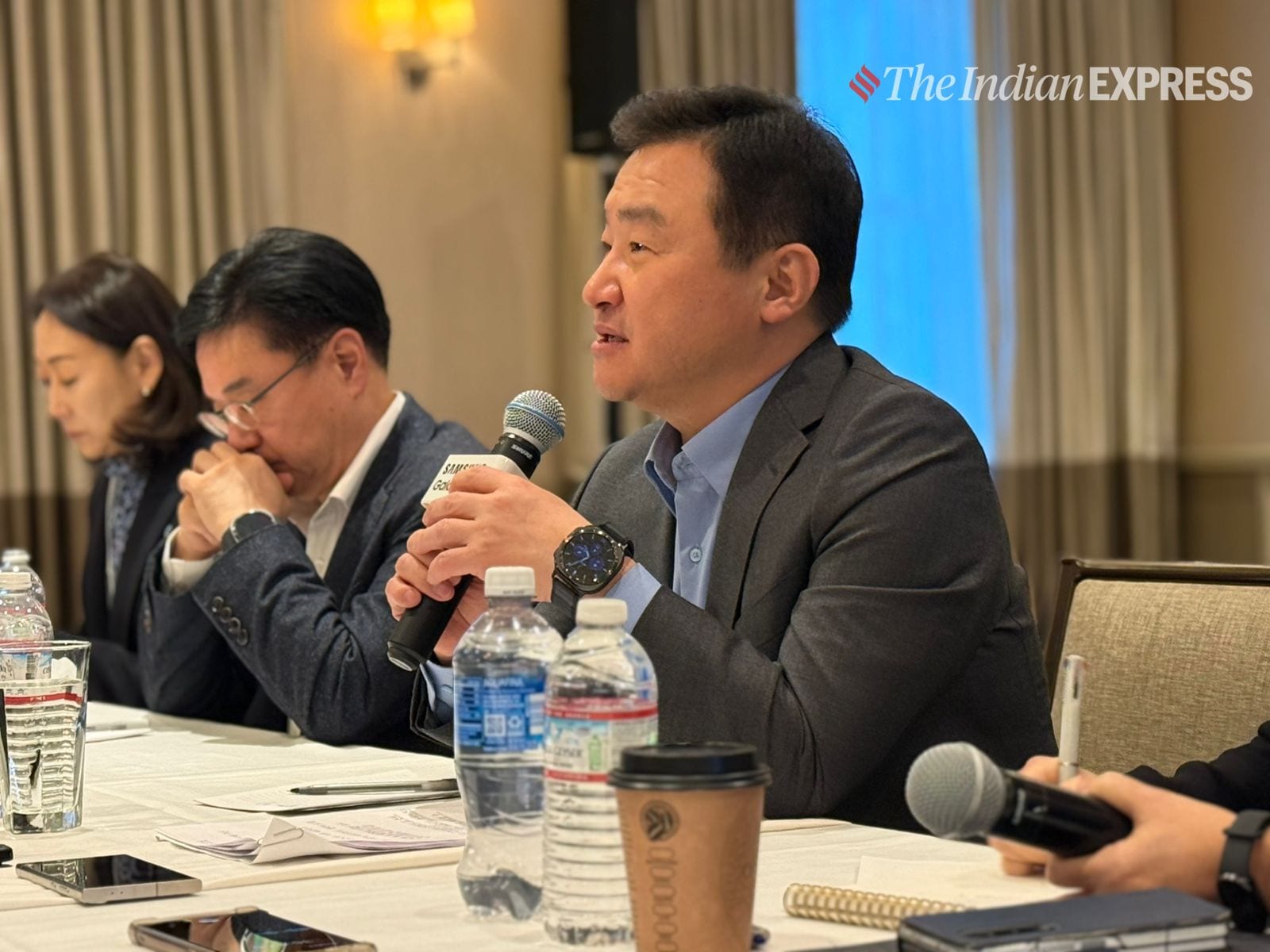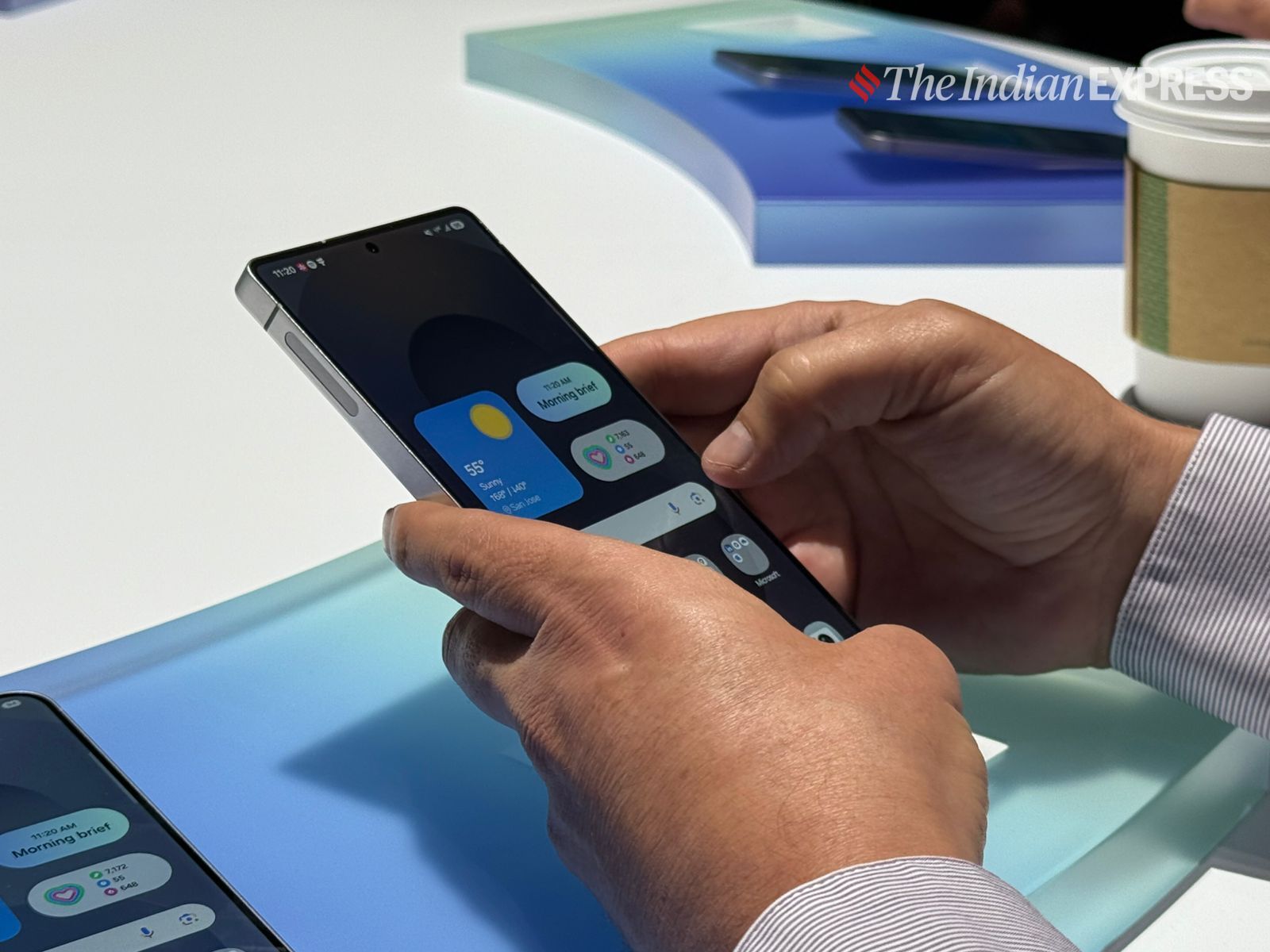
“So far, the user experience has largely been based on the interface of applications and touch on smartphones. However, in the mobile AI era, the main user experience will be based on AI agents and multi-modality. But I do not foresee AI agents and multi-modality being the only experiences offered by AI phones. I believe these will be the main modes of interface, but we will still have what we’ve always had on smartphones, like applications and touch,” Roh told indianexpress.com in Korean, translated by a company translator.
 Samsung’s head of mobile, TM Roh, spoke about how AI agents and personalisation may change the smartphone experience in the mobile AI era. (Image credit: Anuj Bhatia/Indian Express)
Samsung’s head of mobile, TM Roh, spoke about how AI agents and personalisation may change the smartphone experience in the mobile AI era. (Image credit: Anuj Bhatia/Indian Express)
The apps and touch-based interface have been the foundation of modern smartphones for years, deeply integrated into the core mobile experience. Roh’s comments made it clear that while artificial intelligence (AI), particularly generative AI, could usher in a completely new way of interacting with smartphones, we are far from the end of the app era. In fact, the idea that the days of apps are numbered is far-fetched, as observers have suggested that an app—a standalone piece of software with a screen of icons that must be located, opened, and engaged with—still delivers the optimal experience on mobile.
As AI becomes the key focus for Samsung this year, the company is going all in on AI agents—a new type of artificial intelligence program that can handle multistep tasks like booking tickets, not just routing but actually responding to user requests, all with minimal human supervision. For example, Samsung has introduced something called AI Select on the new Galaxy S25. When invoked, AI Select will scan the screen and suggest actions based on what it sees. The model powering this feature is multimodal, so it’s not limited to reading just text. For instance, if you bring up AI Select while watching a YouTube video, the tool will offer to create a GIF for you. The goal here is to simplify actions that previously might have required multiple apps and steps.
Apps are still the primary way of interacting with smartphones, but more and more features on phones no longer require apps altogether. The touch interface is fading into the background, and voice is becoming the primary way to locate and find content, such as driving directions or playing music.
“What we’ve seen with the adoption of AI capabilities on smartphones so far is that AI technology has typically been applied to individual applications, meaning it upgrades the performance or features of each app. And perhaps that’s why the use or adoption of AI has been limited until now. But with the S25, what we’ve done is apply AI technology more broadly, turning it into an AI agent that offers multimodal capabilities and a higher level of personalisation,” he added.
Story continues below this ad
 Samsung is using a hybrid AI approach developed in collaboration with Google. (Image credit: Anuj Bhatia/Indian Express)
Samsung is using a hybrid AI approach developed in collaboration with Google. (Image credit: Anuj Bhatia/Indian Express)
Just as apps and the touch interface unified the smartphone experience, Samsung is trying to replicate that with AI agents and multimodality as part of its larger push with its artificial intelligence offerings, called Galaxy AI. Samsung said there are 200 million Galaxy AI devices in use around the world.
For example, you can look up the date of a Coldplay concert with your voice, add it to your calendar, and send the details to your friend via text—all with your voice. The S25 Ultra understands the context and knows which apps to use to complete these tasks for you. So, while apps still have a role to play, they are no longer the center of the interface.
Samsung’s aggressive push to make AI work on smartphones comes at a time when the company is looking to drive sales of its premium phones, as more consumers are holding onto their devices for longer.
Still, not everyone agrees that AI may alone drive sales of new phones. But Samsung, like any other tech company, is taking a long-term bet on AI.
Story continues below this ad
Experts say that Samsung is using its Galaxy AI to differentiate its flagship phones from competitors, especially Apple, which hasn’t had a smooth rollout of Apple Intelligence. This may explain why Samsung spent so much time talking about AI, as it plays a significant role in the new Galaxy AI, during the Unpacked.



 Samsung’s head of mobile, TM Roh, spoke about how AI agents and personalisation may change the smartphone experience in the mobile AI era. (Image credit: Anuj Bhatia/Indian Express)
Samsung’s head of mobile, TM Roh, spoke about how AI agents and personalisation may change the smartphone experience in the mobile AI era. (Image credit: Anuj Bhatia/Indian Express) Samsung is using a hybrid AI approach developed in collaboration with Google. (Image credit: Anuj Bhatia/
Samsung is using a hybrid AI approach developed in collaboration with Google. (Image credit: Anuj Bhatia/




